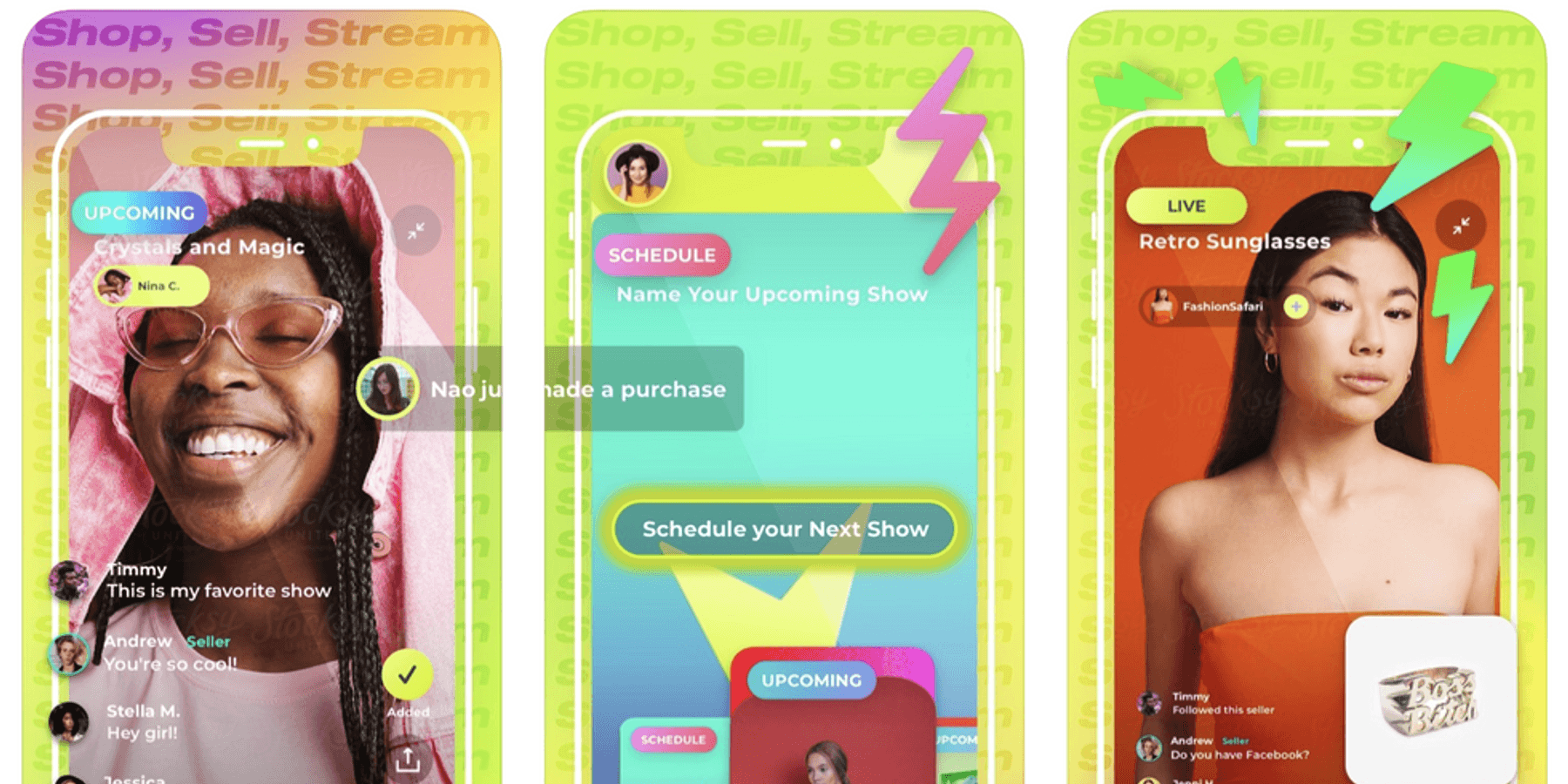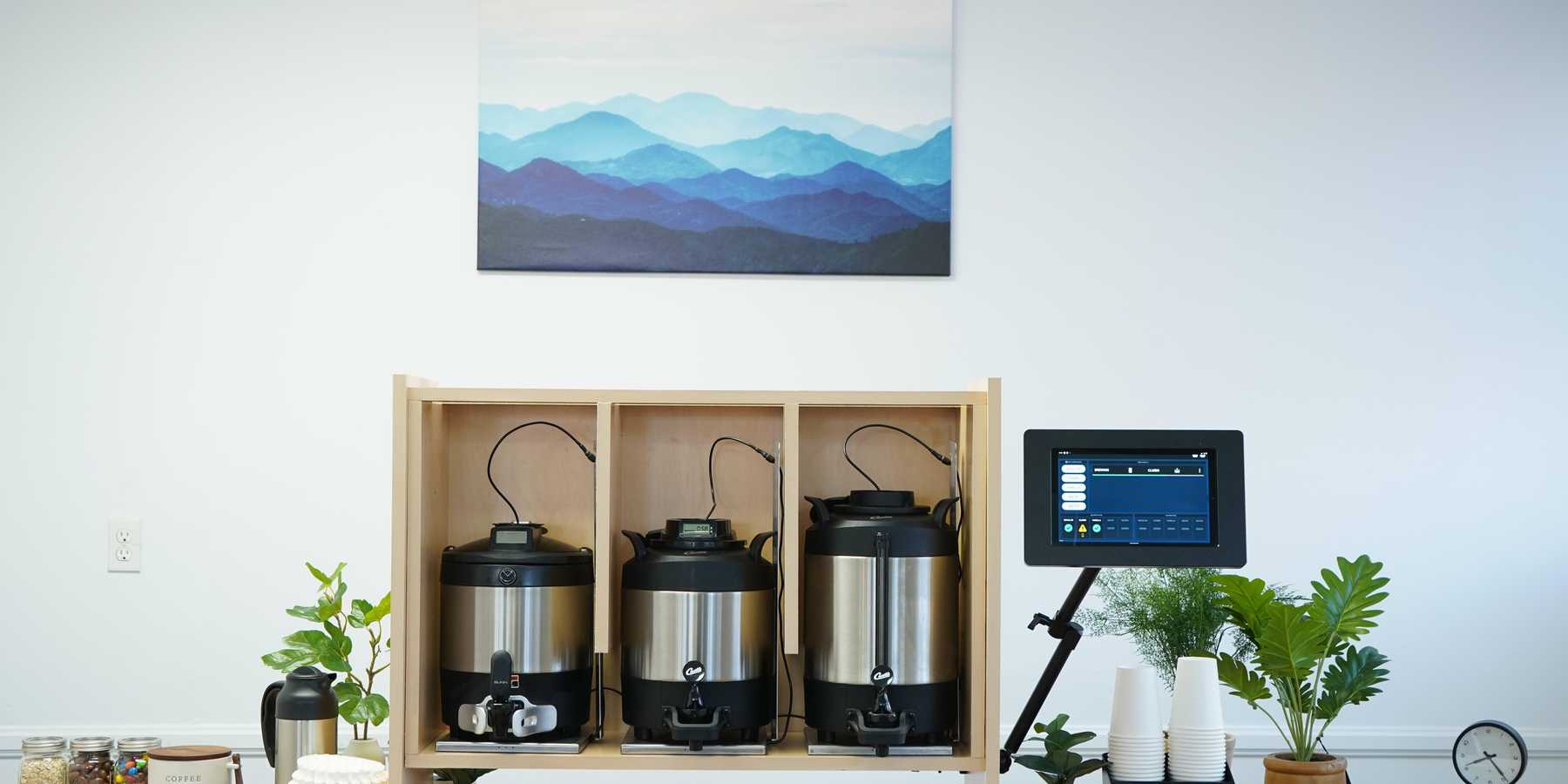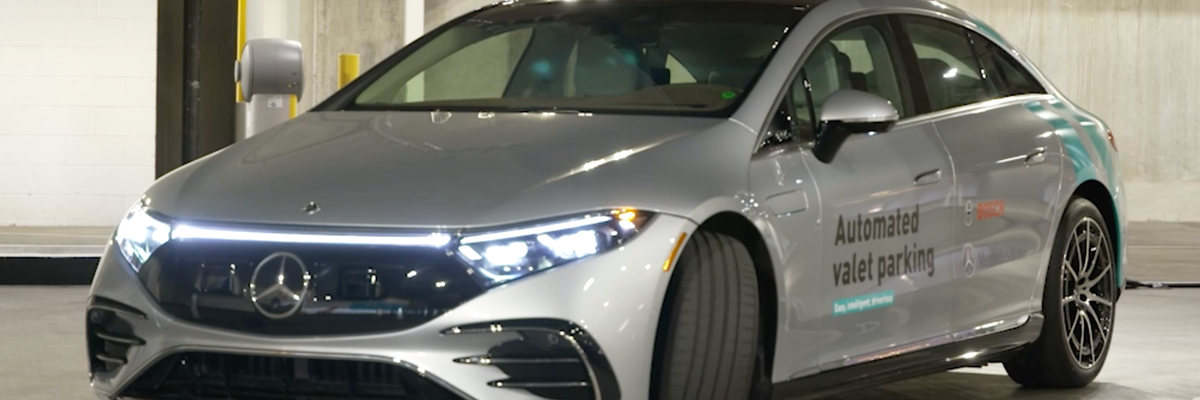

Get in the KNOW
on LA Startups & Tech
X
Courtesy of Mercedes-Benz/Bosch
Mercedes-Benz Offers a Glimpse Into a Future Where Your Car Parks Itself
Samson Amore
Samson Amore is a reporter for dot.LA. He holds a degree in journalism from Emerson College. Send tips or pitches to samsonamore@dot.la and find him on Twitter @Samsonamore.
Sign up for dot.LA's daily newsletter for the latest news on Southern California's tech, startup and venture capital scene.
Angelenos famously hate parking, but soon their cars may be able to park themselves thanks to a collaboration between Mercedes-Benz and German engineering firm Bosch.
At a demonstration in Downtown Los Angeles on Wednesday, Mercedes and Bosch gave the first U.S. test run showcasing the fruits of their collaboration: an electric Mercedes-Benz 2022 EQS 580 luxury sedan capable of navigating itself into a parking spot.
Painted in bright teal stripes, the sedan first let its driver out at a designated spot. Then, a tap of a Mercedes-Benz phone app locked the vehicle and sent it, at a gradual pace, to the first available parking space. Later, a ping from the app woke up the car—which turned itself on, pulled out of the parking spot and slowly made its way to the driver’s pickup point.
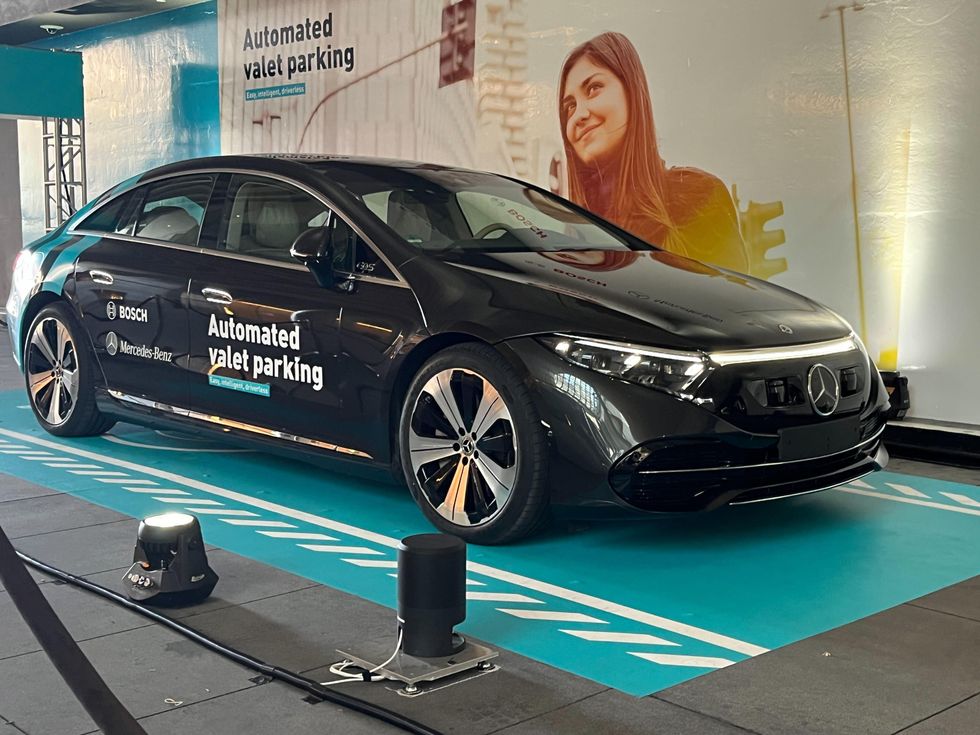
A Bosch engineer stepped in front of the car several times as it was driving to demonstrate its safety features; if sensors detect a presence or any motion in front of the car, they’ll tell it to stop a safe distance away. (For extra security, a person walked alongside the car with an emergency shut-off button.)
Kay Stepper, Bosch’s senior vice president of automated driving for North America, noted that the self-parking technology relies on sensors and cameras built into its surrounding environment, which guide the car into its space. (The sensors are installed on the ground, while the cameras are mounted above.) He added that the technology could be applied to any type of car, so long as a manufacturer makes it compatible with its vehicle.
“The unique thing is really that we are not using any of the in-vehicle sensors—it’s a purely infrastructure-based solution,” Stepper told dot.LA.
Courtesy of Mercedes-Benz/Bosch
The vehicle pulls out from its parking spot and drives itself to its owner.
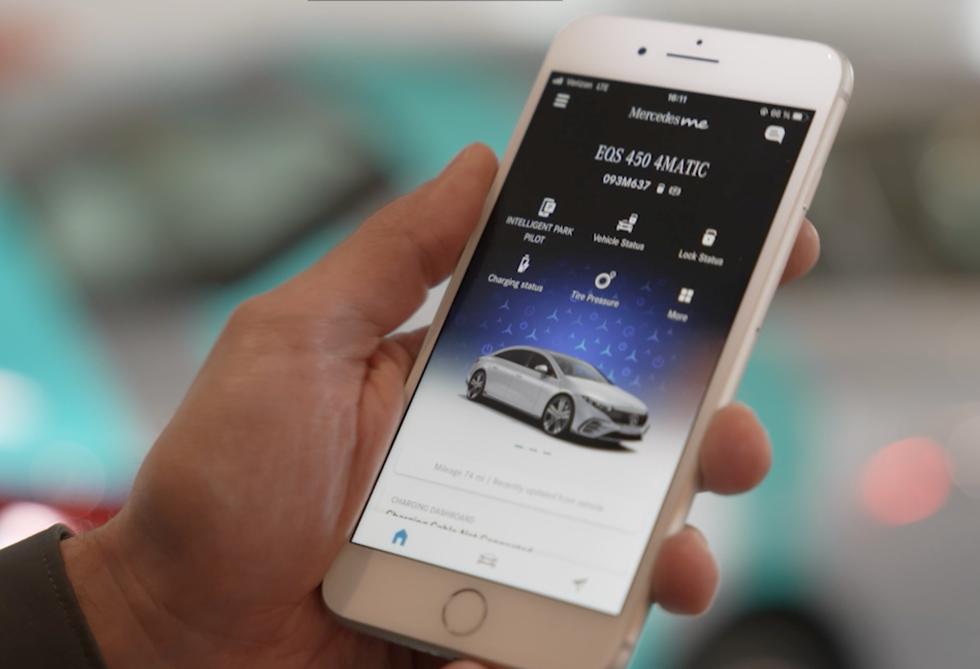
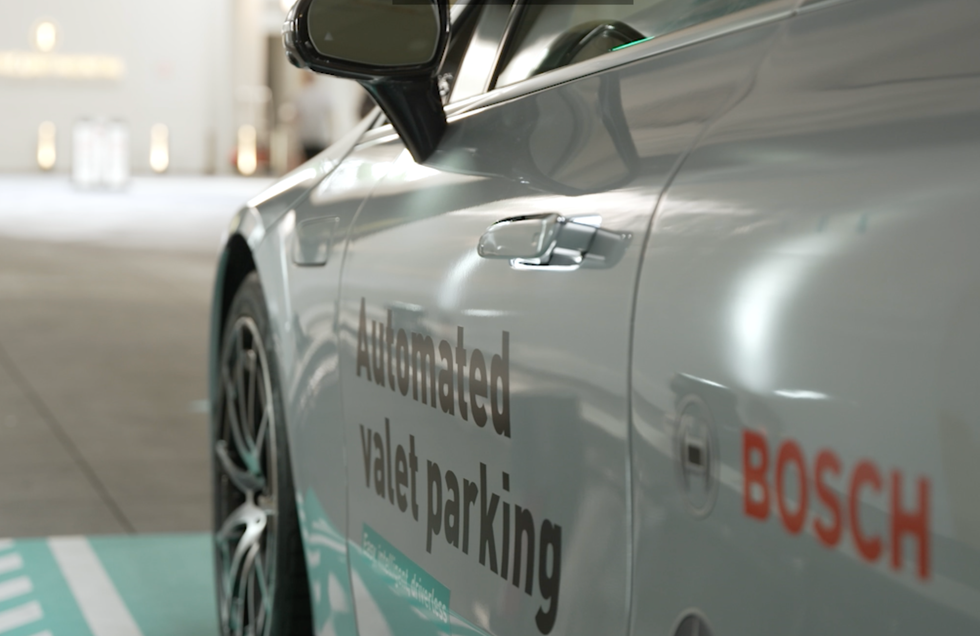
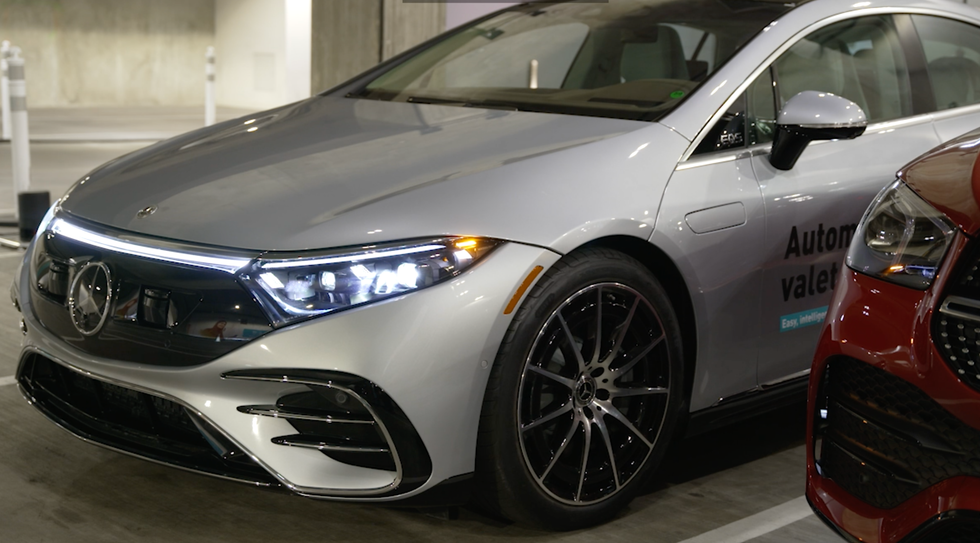
The demo marked the first time that Mercedes and Bosch have tested the technology outside of Germany. In their home country, the driverless parking capability is already installed and ready to use at Stuttgart Airport pending final regulatory approval, according to Philipp Skogstad, Mercedes’ president and CEO of North American research and development.
A handful of other auto industry names are also investing in automated valets, including the Volkswagen Group-owned CARIAD, which demonstrated its technology at an industry summit in Munich last. Yet another competitor is Maryland-based STEER. Other companies focused on autonomous technology from more of a road-driving perspective are Google’s Waymo and, of course, Tesla.
Skogstad acknowledged the increasingly crowded playing field. “Automated driving is such a complex task requiring so many pieces to come together that nobody can do that alone,” he said. “No matter how much money you have, you need partners.”
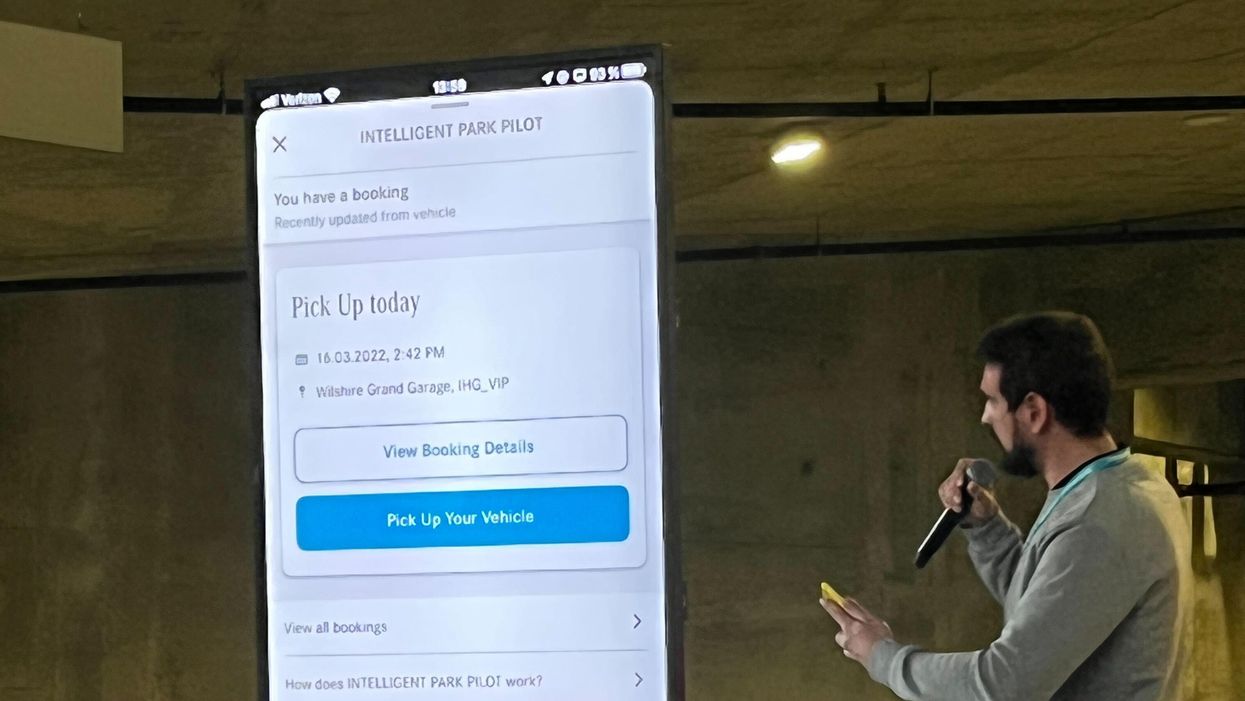
Stepper noted that Bosch is “intensely” focused on finding collaborators in the “smart infrastructure” space who can help it implement a driverless parking network. The next step, he added, is to convince local parking operators to invest in the technology. Without human error (consider that driver in your apartment building’s garage who’s always double-parked), he estimated that a fully-automated parking lot could fit up to 20% more cars.
And what about the valet workers—such as those on hand at the demo, who were kind enough to park cars for the event’s attendees the old-fashioned way? A Bosch spokesperson noted that they wouldn’t exactly be put out of business, as self-parking garages would still need humans to operate and maintain their technology and act as a safeguard.
From Your Site Articles
- Autonomous Vehicle Companies Doubled Their Testing Miles - dot.LA ›
- Motional Expands Its Autonomous Vehicle Operations in LA - dot.LA ›
Related Articles Around the Web
Samson Amore
Samson Amore is a reporter for dot.LA. He holds a degree in journalism from Emerson College. Send tips or pitches to samsonamore@dot.la and find him on Twitter @Samsonamore.
https://twitter.com/samsonamore
samsonamore@dot.la
Popshop Live Ramps Up, Betting Live-Shopping Is the Future of Ecommerce
02:54 PM | July 08, 2021
As the COVID-19 pandemic destroyed small businesses, some struggling companies turned to livestreaming-based ecommerce business Popshop Live to stay afloat.
Now, Popshop Live wants to prove that ecommerce via live streaming is here to stay.
Valued at $100 million, the company announced a Series A round of funding Thursday. Popshop declined to disclose how much it raised in the funding round, though TechCrunch reported the funding was around $20 million.
The round was led by Benchmark and included TQ Ventures, Mantis VC and Access Industries.
Popshop Live also hired former Instagram and Instacart executive Bangaly Kaba to lead platform growth and former head of Uber Eats Jason Droege to lead expansion, the company announced.
Founded in 2019, Popshop is one of several Los Angeles-based startups competing in the emerging livestreaming ecommerce world that includes talkshoplive, a streaming service for celebrities, and Whatnot, a streaming service for collectibles.
"Livestream commerce is not just a trend in China and through the pandemic," said Popshop Live board member Matt Cohler in announcing the raise. "It is an emerging multi-billion-dollar phenomenon whose growth is accelerating every day."
The company sees itself as a combination of online commerce with the experience of in-person shopping. Customers can scroll through live feeds of merchants selling items, interact with sellers and purchase items through Popshop's app. The startup claims that traditional brick-and-mortar sellers are shifting their focus to its platform, after seeing higher sales and rates of customer convergence.
From Your Site Articles
- Online Shopping Trends: Livestreaming, AR and Influencers - dot.LA ›
- Popshop Live's Twist on E-Commerce - dot.LA ›
- Whatnot Gets a $260M Boost To Continue Category Expansion - dot.LA ›
Related Articles Around the Web
Read moreShow less
Bernard Mendez
Bernard Mendez is an editorial intern at dot.LA. He attends UCLA, where he is pursuing a bachelor’s degree in applied mathematics. Mendez was previously an editor at the Daily Bruin, the student newspaper at UCLA.
https://twitter.com/bernardhmendez
bernard@dot.la
Miso Robotics, Panera Bread Team on Coffee Monitoring System
05:00 AM | April 12, 2022
Courtesy of Miso Robotics
Pasadena-based Miso Robotics has partnered with yet another major restaurant chain to deploy its automated food-service technology—this time teaming with Panera Bread to roll out an AI-powered coffee monitoring system that aims to provide customers with freshly brewed coffee throughout the day.
Panera will begin using Miso’s CookRight Coffee system at select Midwest locations later this month, the companies said Tuesday. The technology uses proprietary sensors that can measure coffee temperature, how much coffee has been dispensed and how long since a newly brewed batch was last placed in a coffee urn, making it easier for Panera workers to maintain their coffee stations.

Miso began developing CookRight Coffee in September with input from Panera, whose employees had complained that the constant back-and-forth of checking on the restaurant’s coffee dispensers was a time suck. Miso sought to address those concerns by designing a user interface that allows Panera employees to access and view a coffee station’s metrics on a tablet without needing to physically check the urns.

Miso Robotics chief strategy officer Jake Brewer.
Courtesy of Miso Robotics
“We are fortunate that Panera was seeking something to solve this need; at the same time, we were seeking to develop something to solve this for the [restaurant] industry,” Miso chief strategy officer Jake Brewer told dot.LA. “While [Panera employees are] doing their primary tasks—serving the guests and making food—they can always be monitoring the coffee.”
Brewer did not provide the price of the CookRight Coffee system or financial details of Miso’s partnership with Panera.
Last month, the robotics startup partnered with fast-casual chain Chipotle on an AI-enabled tortilla chip-making machine dubbed “Chippy,” which will be trialed at one of Chipotle’s Southern California locations later this year.
It’s also teamed with burger chain White Castle on a burger-flipping robot nicknamed “Flippy,” and is developing an automated soda fountain machine named “Sippy.”
“We’re able to scale products quicker and quicker, because we’re using the same building blocks,” Brewer said. “Coffee was just the next one that was kind of timed with a big customer who was looking for it.”
Miso, which is backed by Santa Monica-based food-tech incubator Wavemaker Labs, is currently in the process of raising a Series E funding round that initially launched with a $40 million target. Brewer said Miso has already secured more than $5 million in funding through the round, which he noted is now projected to raise between $25 million to $30 million in total capital.
From Your Site Articles
- Miso Robotics Is Preparing to Launch a $40M Series D Raise - dot.LA ›
- Miso Robotics, Chipotle Partner On Robot-Made Tortilla Chips - dot.LA ›
- Miso Robotics Staffs Jack in the Box with New Robot - dot.LA ›
Related Articles Around the Web
Read moreShow less
Decerry Donato
Decerry Donato is a reporter at dot.LA. Prior to that, she was an editorial fellow at the company. Decerry received her bachelor's degree in literary journalism from the University of California, Irvine. She continues to write stories to inform the community about issues or events that take place in the L.A. area. On the weekends, she can be found hiking in the Angeles National forest or sifting through racks at your local thrift store.
RELATEDTRENDING
LA TECH JOBS

